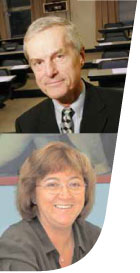High Tech Cheating (Page 3)
Chemistry professor David Harpp and Associate Dean of Arts Enrica Quaroni.
Photos: Owen Egan and BG Bibeau

To Catch a Cheat
In the world of innovative plagiarism-prevention strategies, McGill is already way ahead of other universities. In 1989, chemistry professor David Harpp was told that two students had boasted of successfully cheating on a multiple choice exam - one had simply copied the answers recorded by the other on a computer card. The informant did not want to name the students, so Harpp developed a program that compared wrong answers. He enlisted the help of Chemistry department colleague James Hogan and Debra Simpson of Network and Communications Services.
"If you have 500 people in a class," says Harpp, "there are about 125,000 unique pairings. I plotted all the relationships, created a 3-D map, and found the couplings that were way off the norm." His analysis turned up several pairs who had many identical wrong answers and were seated in proximity. "The odds of them getting all the wrong answers identical were staggering: many billions to one," he says. Clearly, some "force" other than mere coincidence was at work.
Harpp developed a simple system for discouraging would-be cheaters - he implemented different versions of multiple choice exams and assigned students to specific seats. "A student once told me that it was almost impossible not to cheat, as the answers are there right in front of you. And that was true," he says. "But as a result of our changes, no-one has an eyeball on any exam identical to his or her own. I think we've reduced exam cheating to the lowest level possible." The University Senate has adopted Harpp's measures for all multiple choice final examinations: last year, for one semester, that meant 83 courses that combine for 15,000 students. All exam covers carry an explanation of the system, and in 2003-04, only two students were caught cheating. Like Bruce Shore, Harpp stresses that "the emphasis is always on prevention."
In total, that academic year saw 110 allegations of plagiarism, with 14 exonerated, 16 given a disciplinary record, and the remainder penalized with some degree of admonishment - a recent gradation in the penalty system, amounting to a reprimand with certain penalties, such as a zero for the paper or a failing grade in the course, but not a permanent disciplinary record.
If an instructor suspects plagiarism, he or she submits the case, including evidence, to a disciplinary officer. At this point, the professor is out of the loop and the University's formal disciplinary procedure kicks in: the student receives a registered letter, arranges for an appointment, and receives a hearing, attended by the student, a University representative (usually the Associate Dean of Student Affairs for the faculty), and sometimes an internal advisor brought by the student, often someone from the legal advocacy clinic who helps the student prepare and provides moral support.
Says Enrica Quaroni, Associate Dean (Student Affairs) in the Faculty of Arts, "Often, students defending themselves latch onto the clause in the Code of Conduct that says there has to be intent to deceive. I always tell them, 'I cannot go into your mind to find what you were thinking at the time, but you knew these words were not yours, you did not reference them, and you submitted the paper knowing that the words did not belong to you.' And the student usually says, 'Yes, I did.' That, to me, shows intent," says Quaroni. She estimates that she normally receives about a dozen cases of plagiarism annually. So far this year, she says she's had about 25 cases, "a huge increase over the 12 to 15 of the past."
Don't Do Like Ralph Did
If students are to learn about academic integrity, they must be taught. Karen Nicholson, Reference and Instruction Librarian in the McLennan Library, has organized "information literacy" training sessions, designed to help students find, evaluate and use information properly. Part of her mandate includes teaching the concept of academic integrity.
"A lot of undergraduates seem genuinely unaware that they can't cut and paste things from the Internet into their papers," she says. "So the more involved departments and professors become, the better." Nicholson has a point. No less a figure than Alberta Premier Ralph Klein used the "I didn't know I wasn't allowed to do that" excuse when an essay he wrote for an online course at Lakehead University included large blocks of text that had been copied and pasted from other sources, without proper referencing.
Quaroni points out that starting in September 2005, the Faculty of Arts will be giving out free copies of Charles Lipson's book Doing Honest Work in College to incoming students. "It is a very good book that tells students about academic integrity, why it is important to do honest work, gives good and bad examples of paraphrasing, provides tips on how to take notes so students are always aware of which words are theirs and which aren't, and finally, gives examples of various citation styles. We felt that this was an important step to take as a preventative and educational measure."
But many students are fully aware that copying from other sources is a cardinal sin in academe, yet do it anyway. What causes such ethical lapses? "Students give reasons from 'I was having personal difficulties' to 'I couldn't concentrate' to 'It was the last minute and I didn't know what to do,'" Quaroni says. Increased awareness about academic integrity means students may be more likely to seek other ways of addressing these problems, creating, in essence, an exercise in learning about choices and responsibility. As Shore says, "Students are generally wonderful people. Most cheating occurs under pressure, at the last minute, when they are really making desperate choices."
In the meantime, the TurnItIn debate and the academic integrity policy's consultation process have been raising awareness. "We benefit from people thinking about these problems and trying to find solutions," Mendelson points out. "The discussion among students and faculty, in the Senate and in student newspapers is terrific."
He isn't just being an optimist. McGill's code of conduct already provides plenty of bite. Honest communication is critical to academic integrity. It is, after all, the main point.

istockphoto.com


